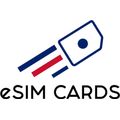eSIM Cards, una marca de Pentagram Systems, se dedica a revolucionar la forma en que te mantienes conectado en el Reino Unido y Europa. Como proveedor líder de tecnología eSIM, ofrecemos soluciones innovadoras y sin complicaciones adaptadas a las necesidades de los viajeros modernos, los profesionales de negocios y los entusiastas de la tecnología. Nuestra misión es brindar conectividad instantánea y sin complicaciones, sin importar dónde te encuentres en el Reino Unido o Europa.

eSIM Cards, una marca de Pentagram Systems, se dedica a revolucionar la forma en que te mantienes conectado en el Reino Unido y Europa. Como proveedor líder de tecnología eSIM, ofrecemos soluciones innovadoras y sin complicaciones adaptadas a las necesidades de los viajeros modernos, los profesionales de negocios y los entusiastas de la tecnología. Nuestra misión es brindar conectividad instantánea y sin complicaciones, sin importar dónde te encuentres en el Reino Unido o Europa.
Planes de datos eSIM eSIM Cards para Singapur
Preguntas Frecuentes
¿Ofrecen eSIM Cards eSIM con datos ilimitados para Singapur?
eSIM Cards no ofrece una opción eSIM de datos ilimitados para Singapur. Los viajeros pueden elegir entre planes de datos fijos en su lugar. Por ejemplo, la eSIM Travel de 100 GB para Singapur es válida por 30 días y cuesta 24, 29 USD, mientras que la eSIM Travel de 20 GB está disponible por 30 días a 23, 41 USD. Estos planes de datos fijos pueden ofrecer una solución más rentable para la mayoría de los usuarios, a menos que esperen usar datos mucho más allá del monto asignado.
¿eSIM Cards ofrece eSIM de Singapur con número de teléfono y SMS?
eSIM Cards no ofrece planes de eSIM de Singapur que incluyan un número de teléfono o capacidad de SMS. Todas las ofertas de eSIM de Singapur del proveedor son solo datos; se pueden usar con servicios de mensajería y llamadas basados en Internet como WhatsApp, Telegram e iMessage, que operan sobre la conexión de datos en lugar de un número de teléfono tradicional.
¿Cuántos planes de datos ofrece eSIM Cards para Singapur?
eSIM Cards offers six single‑country data plans and two multi‑country plans for Singapore. The available plans range in price from roughly $5.16 to $68.74 and provide data caps between 3 GB and 100 GB. Validity periods vary from 5 to 30 days, and a selection of the plans includes tethering permissions.
Resumen con Gen AI. Última actualización:




